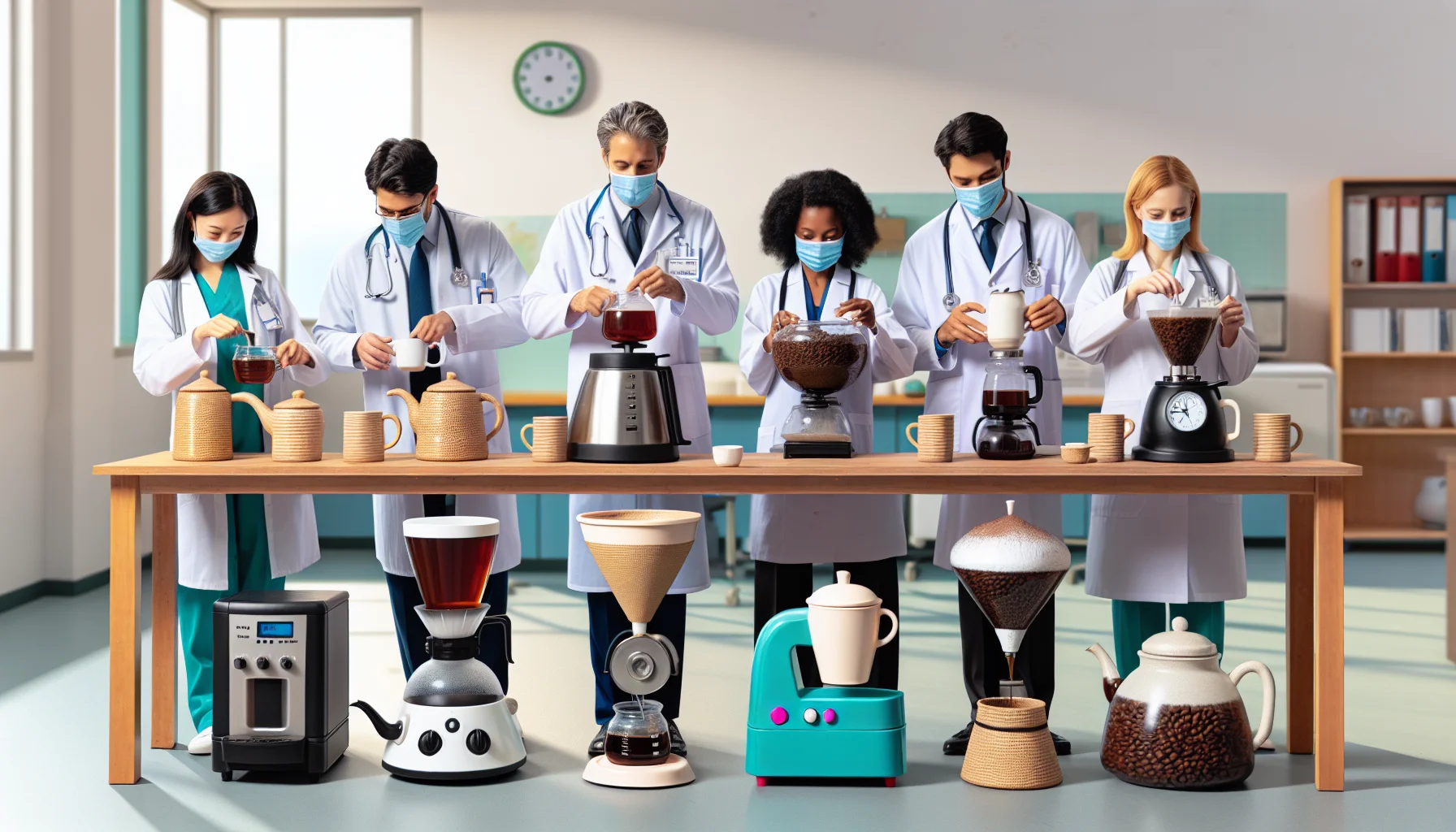Brewing Balance in Med Life Quiz
Test Your Knowledge
Question of
Brewing Balance in Med Life: An Introduction
The journey through medical life, be it as a student or a professional, is often marked by long hours, relentless stress, and the perpetual quest for balance. Amidst the chaos, the simple ritual of tea or coffee brewing emerges not just as a means to caffeination, but as a profound practice of mindfulness and balance. This act transcends the mere preparation of a beverage; it becomes a momentary retreat from the demands of med life, allowing for a pause, a breath, and a much-needed reset. Engaging in the methodical steps of brewing, from selecting the tea leaves or grinding the coffee beans to pouring the hot water and finally savoring the aroma and taste, can serve as a meditative practice. It encourages a focus on the present, a break from the digital and clinical overload, and fosters a connection to the sensory experiences that ground us. Beyond the brew, exploring the vast world of tea and coffee varieties, each with its own flavor profile and origin story, adds an enriching layer to this ritual. It's an invitation to slow down, to appreciate the nuances, and to find a semblance of balance in the demanding rhythm of medical life. Thus, the simple act of brewing tea or coffee becomes not just about the drink, but about cultivating a moment of tranquility, focus, and balance amidst the rigors of med life.
The Art of Brewing: Tea vs Coffee
The art of brewing, whether it's for tea or coffee, is a ritual that has been perfected over centuries, offering a vast array of flavors and experiences. Tea brewing is often seen as a delicate process, involving the steeping of dried tea leaves in hot water for a specific duration. This method allows the water to extract flavors and antioxidants from the leaves, with the steeping time varying depending on the type of tea. Green teas might steep for 1-3 minutes, while black teas can go for 3-5 minutes to achieve their characteristic flavors. On the other hand, coffee brewing involves a more complex process of extracting flavor from ground coffee beans. The most common methods include drip brewing, espresso, and French press, each offering a unique taste and texture. Drip brewing passes hot water through ground coffee, creating a smooth and consistent flavor, while espresso uses high pressure to extract a rich and concentrated shot. The French press method allows coffee grounds to steep in hot water before being separated by a plunger, resulting in a full-bodied coffee. Both tea and coffee brewing have evolved with technology, leading to a variety of gadgets and machines designed to perfect the brew. From electric kettles with precise temperature controls for tea to sophisticated espresso machines for coffee, the options are endless. Ultimately, whether you prefer the subtle complexities of tea or the robust intensity of coffee, the brewing process is key to unlocking the full potential of flavors.
Health Benefits of Tea and Coffee
Tea
- Rich in antioxidants which can help reduce the risk of chronic diseases and improve overall health.
- Contains compounds that can improve brain function and enhance mental performance.
- May boost the immune system thanks to its antibacterial and anti-inflammatory properties.
- Can aid in weight loss by enhancing metabolic rate and fat burning.
- Linked to a lower risk of heart disease due to its ability to improve cholesterol levels.
Coffee
- High in antioxidants, contributing to overall health and protection against diseases.
- Can improve energy levels and increase alertness by blocking an inhibitory neurotransmitter in the brain.
- May boost metabolic rate and enhance fat burning, aiding in weight management.
- Linked to a reduced risk of type 2 diabetes through its influence on insulin sensitivity and glucose metabolism.
- Contains several nutrients, including B vitamins, potassium, and riboflavin, that contribute to a healthy diet.
How Brewing Can Help Med Students
The process of brewing tea or coffee goes beyond just preparing a beverage; it can serve as a therapeutic ritual for medical students amidst their rigorous schedules. Engaging in the meticulous steps required to brew a perfect cup of tea or coffee allows for a moment of mindfulness and a break from the constant pressure of studies. This act of brewing not only provides a sensory experience through the aroma and warmth but also instills a sense of accomplishment and calmness. Moreover, the caffeine found in these beverages can offer the necessary mental alertness for their studies. Thus, incorporating tea or coffee brewing into their daily routine can help medical students find balance, enhance their focus, and foster a moment of tranquility in their otherwise hectic lives.
Brewing Techniques for the Busy Med Student
- Cold Brew Coffee: Prepare it the night before in a large batch. Simply steep coffee grounds in cold water for 12-24 hours, then strain. It's refreshing, less acidic, and can be stored in the fridge for quick access.
- Instant Coffee: While not the most gourmet option, modern instant coffees have improved significantly. Just add hot water to a high-quality instant coffee, and you're ready to go.
- Tea Bags: Opt for high-quality tea bags for a quick, mess-free brewing experience. Herbal and green teas are great for a quick caffeine fix or relaxation during study breaks.
- French Press: Requires minimal prep and brewing time. Just add coarsely ground coffee and hot water, wait for 4 minutes, then press and pour. It's ideal for making multiple cups of coffee at once.
- Single-Serve Pod Coffee Makers: Perfect for busy students needing a quick, no-hassle cup of coffee. While not the most environmentally friendly option, there are reusable pods available.
- Portable Espresso Makers: For those who prefer a stronger brew, a portable espresso maker can be a quick and efficient way to get your espresso shot without a full espresso machine.
- Matcha: Quick and full of antioxidants. Simply whisk matcha powder with hot water for a fast and healthy energy boost.
Best Teas and Coffees for Med Students
| Type | Name | Benefits | Caffeine Content | Recommended Time of Day |
|---|---|---|---|---|
| Tea | Green Tea | Improves brain function, fat loss, protects the brain from aging | 28 mg per cup | Morning/Afternoon |
| Tea | Chamomile Tea | Reduces stress and anxiety, improves sleep quality | Caffeine-free | Evening |
| Coffee | Espresso | Improves memory and concentration, increases alertness | 64 mg per shot | Morning/Early Afternoon |
| Coffee | Cold Brew | Less acidic, smoother taste, boosts metabolism | 200 mg per 16 oz | Morning |
| Tea | Peppermint Tea | Enhances memory and increases alertness, relaxes the body and mind | Caffeine-free | Anytime |
| Coffee | French Press | Rich in antioxidants, customizable strength | 107 mg per 8 oz | Morning/Afternoon |
Creating a Brewing Routine for Balance
For medical students, finding balance amidst the whirlwind of studies, clinical rotations, and exams can be a daunting task. Incorporating a brewing routine into your daily schedule is not just about enjoying your favorite cup of tea or coffee; it's about creating a moment of tranquility and mindfulness. Start by selecting high-quality tea leaves or coffee beans, focusing on flavors that bring you comfort or invigoration. Dedicate a specific time each day for your brewing ritual; early morning or late evening can offer the calm needed for reflection or preparation. Use this time to step away from your studies, to breathe deeply, and to center your thoughts. The act of grinding beans, boiling water, and steeping tea can become meditative, a practice in patience and presence. Equip yourself with a brewing kit that resonates with your personal aesthetic, making the process as pleasing to the eyes as to the palate. This daily routine can become a cornerstone for balance, a physical reminder to pause and replenish your mental and emotional reserves, enabling you to approach your medical training with renewed focus and energy.
Conclusion: Brewing Balance in Med Life
The art of brewing a perfect cup of tea or coffee transcends beyond just a mere morning ritual for medical students; it symbolizes the essence of finding balance amidst their hectic schedules. The meticulous process of brewing, whether it involves grinding fresh coffee beans or steeping loose-leaf tea, serves as a metaphor for the precision and care required in their studies and future medical practices. Incorporating these moments of brewing into their daily routines not only offers a much-needed break but also enhances their mental clarity and focus. Furthermore, the variety of tea and coffee products available caters to the diverse tastes and preferences of medical students, making it an inclusive practice. Ultimately, embracing the culture of tea and coffee brewing can significantly contribute to a more balanced, focused, and enjoyable medical school experience.












